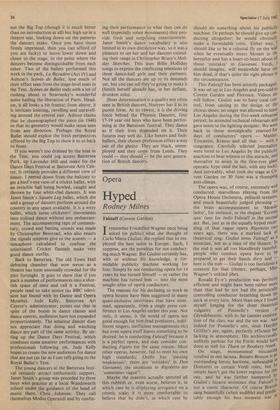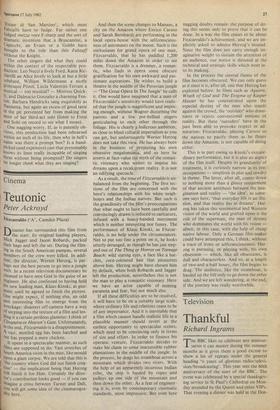Opera
Hyped
Rodney Milnes
Falstaff (Covent Garden) Iremember Friedelind Wagner once being asked (in public) what she thought of Carlo Maria Giulini; she replied that he em- ployed the best tailor in Europe. Such, I suppose, are the penalties for not conduct- ing much Wagner. But Giulini certainly has, with or without his knowledge, a for- midable publicity machine working for him. Simply by not conducting opera for 14 years he has turned himself — or rather the machine has turned him — into the most sought-after of opera conductors.
The reasons for his declining to work in opera houses have been suggested in many quasi-exclusive interviews that have stem- med, apparently, from a single press con- ference in Los Angeles earlier this year. Not only, it seems, is the world of opera not good enough for him (bad producers, indif- ferent singers, inefficient managements etc) but even opera itself leaves something to be desired: he is conducting Falstaff because it is a perfect opera, and may consider con- ducting Figaro for the same reason. Most other operas, however, fail to meet his own high standards; Otello has 'passing weaknesses': there are 'mistakes' in Don Giovanni; the situations in Rigoletto are `sometimes vague'!
Maybe the maestro actually spouted all this rubbish or, even worse, believes it, in which case he is displaying arrogance on a cosmic scale; it is more comfortable to believe that he didn't, in which case he
should do something about his publicitY machine. Or perhaps he should give up con-
ducting altogether: he would obviouslY
make a formidable critic. Either way, 1 should like to be a celestial fly on the wall
when he eventually meets Mozart in the
hereafter and has a heart-to-heart about all those 'mistakes' in Giovanni. Verdi, 1
should imagine, will meanwhile have cut him dead, if that's quite the right phrase in the circumstances.
This Falstaff has been astutely packaged- It was set up in Los Angeles and pre-sold to Covent Garden and Florence. Videos etc will follow. Giulini was to have total con• trol, from casting to the design of the chorus shoes; no singer was allowed to leave Los Angeles during the five-week rehearsal period; he attended technical rehearsals and gave notes to the lighting designer. We were
back in those nostalgically yearned-for days of conductors' opera — Mahler,
Toscanini, Krauss and all that — with a vengeance. Carefully selected journalists were lured to Los Angeles by the publicity
machine to bear witness to this miracle, and
thereafter to assist in the first-ever giant operatic hype (and the last, with any luck).
And inevitably, what took the stage at Co- vent Garden on 30 June was a thumping anti-climax. The opera was, of course, extremely well conducted: marvellous playing from the
Opera House Orchestra, pellucid textures, and much beautifully judged phrasing -- the brass accompaniment to 'Mond°, ladro', for instance, or the elegant `Eccorin qua' tune for bello Falstaff in the second ' act. But, just as in the equally hyped recor- ding of that vague opera Rigoletto two years ago, there was a marked lack of theatrical zing: Giulini loves Falstaff as 3 musician, not as a man of the theatre. 111 the end it was all too bloodlessly tasteful, people who conduct opera have to be prepared, to get their hands dirty and here is the nub — Giulini is too fastidious a creature for that (thence, perhaps, Miss Wagner's unkind jibe). Ronald Ey:-e's production was perfectlY efficient and might have been rather more
than that had he not had the artistically controlling conductor breathing down his neck at every turn. More than once I found
myself longing for the sheer theatrical vulgarity of Ponnelle's version • at
Glyndebourne, with its far cannier explorn'
Lion of the class war and the sex war. And indeed for Ponnelle's sets, since Hayden, Griffin's are, again, perfectly efficient but lacking in atmosphere. His architecturallY I unlikely parlour for the Fords would have done as well for Thark or Rookery Nook. On stage, monumental miscasting resulted in one lacuna. Renato Bruson is an outstanding heroic baritone, unbeatable Donizetti or certain Verdi roles, but fle simply hasn't got the lower register for this
one, and he was further hampered by
Giulini's bizarre insistence that Falstaff Is not a comic character. Of course BrusOa sang beautifully (when audible) and prodle, tably enough his best moment was at `Estate di San Martino', which most Palstaffs have to fudge. Far rather one fudged mezza voce F-sharp and the sort of dramatic invention that a Bruscantini, a Capecchi, an Evans or a Gobbi have brought to the role than this Falstaff without the Knight.
The other singers did what they could within the context of the respectable pro- duction: Leo Nucci a lively Ford, Katia Ric- ciarelli an Alice lovely to look at but a little subdued, William Wildermann a nicely grotesque Pistol, Lucia Valentini-Terrani a Musical — too musical? — Mistress Quick- IY, and Dalmacio Gonzalez a charming Fen- ton. Barbara Hendricks sang exquisitely as Nannetta, but again an excess of good taste in the pit prevented her from making the Most of her third-act solo (listen to Freni and Solti on record to see what I mean).
One nagging worry. lf, as is patently ob- vious, this production had been rehearsed within an inch of its life, then why in hell's name was there a prompt box? Is a hand- Picked (and expensive) cast that presumably knows its lines really incapable of singing them without being prompted? Do singers no longer think what they are singing?



































 Previous page
Previous page